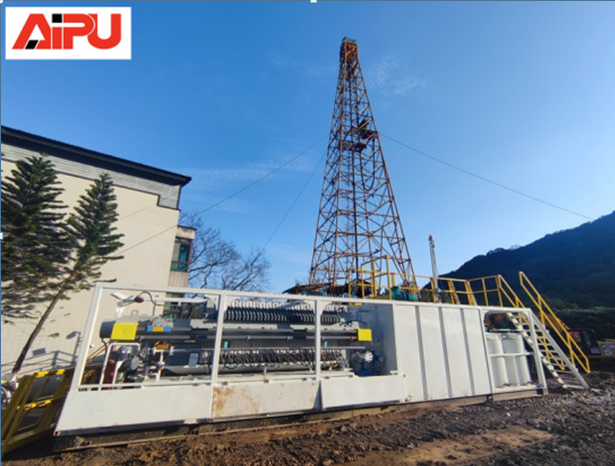Unveiling the Hidden Power in Drilling Operations
In the realm of oil and gas drilling, the shale shaker stands as a pivotal piece of equipment, playing a crucial role in solving drilling separation challenges. This article delves into the key aspects of shale shakers and their significance in the drilling process.
Function and Working Principle
The primary function of a shale shaker is to separate cuttings from the drilling fluid. It operates on a simple yet effective principle. The drilling fluid, carrying various-sized cuttings, is fed onto the shaker screen. The shaker then vibrates the screen at high frequencies, causing the cuttings to move across the screen surface. As the cuttings move, the smaller particles and the drilling fluid pass through the screen openings, while the larger cuttings are retained on the screen and eventually discharged. This separation process is essential for maintaining the quality of the drilling fluid and ensuring its reusability.
Types of Shale Shakers
There are several types of shale shakers available in the market, each designed to meet specific drilling requirements. Linear motion shale shakers are the most common type. They provide a consistent linear vibration pattern, which is suitable for a wide range of drilling conditions. Elliptical motion shale shakers, on the other hand, offer a more complex vibration pattern that can be adjusted to optimize the separation process. Balanced elliptical motion shale shakers combine the advantages of both linear and elliptical motion, providing better performance and efficiency.
Advantages in Drilling Operations
Shale shakers bring numerous advantages to drilling operations. Firstly, they help in reducing the cost of drilling fluid. By separating the cuttings from the fluid, the fluid can be reused, minimizing the need for continuous replacement. Secondly, they improve the overall efficiency of the drilling process. Clean drilling fluid ensures smoother drilling operations and reduces the wear and tear on drilling equipment. Additionally, shale shakers contribute to environmental protection. By properly separating the cuttings, the disposal of drilling waste becomes more manageable and less harmful to the environment.
Challenges and Solutions
Despite their many benefits, shale shakers also face some challenges. One of the main challenges is screen blinding, which occurs when the screen openings become clogged with cuttings. This can reduce the efficiency of the separation process. To address this issue, various anti - blinding technologies have been developed, such as ultrasonic screen cleaning systems. Another challenge is the handling of different types of cuttings. Some cuttings may be sticky or have irregular shapes, making them difficult to separate. Advanced shaker designs and the use of specialized screens can help overcome these difficulties.
In conclusion, the shale shaker is an indispensable tool in the oil and gas drilling industry. It effectively solves the drilling separation challenges, improves operational efficiency, and contributes to environmental sustainability. With continuous technological advancements, shale shakers are expected to play an even more significant role in the future of drilling operations.

Function and Working Principle
The primary function of a shale shaker is to separate cuttings from the drilling fluid. It operates on a simple yet effective principle. The drilling fluid, carrying various-sized cuttings, is fed onto the shaker screen. The shaker then vibrates the screen at high frequencies, causing the cuttings to move across the screen surface. As the cuttings move, the smaller particles and the drilling fluid pass through the screen openings, while the larger cuttings are retained on the screen and eventually discharged. This separation process is essential for maintaining the quality of the drilling fluid and ensuring its reusability.
Types of Shale Shakers
There are several types of shale shakers available in the market, each designed to meet specific drilling requirements. Linear motion shale shakers are the most common type. They provide a consistent linear vibration pattern, which is suitable for a wide range of drilling conditions. Elliptical motion shale shakers, on the other hand, offer a more complex vibration pattern that can be adjusted to optimize the separation process. Balanced elliptical motion shale shakers combine the advantages of both linear and elliptical motion, providing better performance and efficiency.
Advantages in Drilling Operations
Shale shakers bring numerous advantages to drilling operations. Firstly, they help in reducing the cost of drilling fluid. By separating the cuttings from the fluid, the fluid can be reused, minimizing the need for continuous replacement. Secondly, they improve the overall efficiency of the drilling process. Clean drilling fluid ensures smoother drilling operations and reduces the wear and tear on drilling equipment. Additionally, shale shakers contribute to environmental protection. By properly separating the cuttings, the disposal of drilling waste becomes more manageable and less harmful to the environment.
Challenges and Solutions
Despite their many benefits, shale shakers also face some challenges. One of the main challenges is screen blinding, which occurs when the screen openings become clogged with cuttings. This can reduce the efficiency of the separation process. To address this issue, various anti - blinding technologies have been developed, such as ultrasonic screen cleaning systems. Another challenge is the handling of different types of cuttings. Some cuttings may be sticky or have irregular shapes, making them difficult to separate. Advanced shaker designs and the use of specialized screens can help overcome these difficulties.
In conclusion, the shale shaker is an indispensable tool in the oil and gas drilling industry. It effectively solves the drilling separation challenges, improves operational efficiency, and contributes to environmental sustainability. With continuous technological advancements, shale shakers are expected to play an even more significant role in the future of drilling operations.








